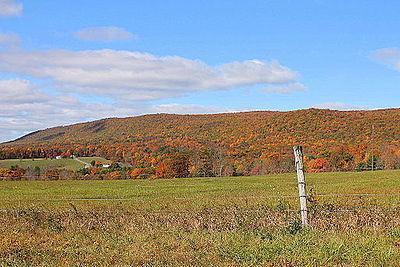The Pennsylvania Game Commission is preparing to boost its land holdings in northern Lancaster County, adding public hunting ground in an area where such lands see heavy use by hunters and nonhunters alike.
At their July 12 meeting, the agency’s board of commissioners announced that “Natural Lands Trust” – now called just Natural Lands – has offered to purchase for the Game Commission 139.44 acres straddling the Lancaster-Lebanon county line to add to the agency’s Game Lands system.
According to the OnX mapping system, the property is currently owned by Byler Management Inc. and sits in Elizabeth Township, Lancaster County, and Heidelberg Township, Lebanon County.
The address listed for the property owner is the same as Iron Valley Golf Club, which is owned by Byler Holdings.
The property is on the east side of Route 501, just north of the boundary for State Game Lands 46, but is not connected to the game lands.
In their meeting agenda, the game commissioners noted SGL 46 “is heavily used by hunters and nonhunters, and this acquisition would increase the opportunity for these groups to enjoy outdoor wildlife related recreational pursuits.”
SGL 46 already covers 6,254 acres in Lancaster and Lebanon counties, and includes the Middle Creek Wildlife Management Area.
READ: Pa. Bureau of Forestry planning new forms of protection for state forests, plants

Natural Lands expects to close the purchase of the Byler property early next year, according to Kit Werner, senior director of communications for Natural Lands.
That closing must occur before the Game Commission would open the property to public access, according to Travis Lau, the agency’s spokesman.
Because the land deal has not yet been completed, Lau was unable to provide details about the property acquisition, and suggested a reporter contact Natural Lands.
Werner likewise said Natural Lands typically doesn’t comment on land acquisitions that have not yet been closed.
A reporter’s phone call to Jonathan Byler, president and CEO of Byler Holdings, was not returned last week.
Natural Lands is a private, nonprofit organization that preserves open space in eastern Pennsylvania and southern New Jersey, according to its website.
"Natural Lands has been working to save open space—more than 135,000 acres and counting—care for nature, and connect people to the outdoors in eastern PA and southern NJ for more than 70 years," said Natural Lands President Oliver Bass.
"We save land through many methods, including acquiring land vulnerable to development, and transfer it to responsible, stewardship-focused entities such as the PA Game Commission, PA Bureau of Forestry, or state parks.
“Rather than being another subdivision or commercial business center, the land becomes open to all to enjoy and explore. At the same time, these permanently protected acres help clean our air and water, cool our climate, store carbon, and give wildlife habitat.”
According to the information disseminated by the Game Commission at the board’s July 12 meeting, Natural Lands is planning to buy the Byler property using a variety of funding sources, including federal money made available through the U.S. Fish and Wildlife Service Highlands Conservation Act.
READ: Are we on the doorstep of Sunday hunting in Pennsylvania? Not quite
That act authorizes the federal government to provide financial assistance to entities in Connecticut, New Jersey, New York and Pennsylvania to preserve high priority land in the Highlands region.
That region spans 3.4 million acres across those states, and is “distinguished by Appalachian ridges, hills and plateaus” and “marked by deciduous and coniferous forests, streams and lakes, and thousands of plant and animal species,” according to the USFWS website.
“It is not only ecologically diverse, but sustains forest management, working farms, nature-oriented recreational opportunities, and clean water for the many people who live in the region.”
In Lancaster County, 32 municipalities that have land on South Mountain, Welsh Mountain, the Furnace Hills and Mine Ridge are covered by the Highland Conservation Act.
The Byler property is in the Furnace Hills, where State Game Lands 46, 156 and 145 are located. Combined, those three properties cover about 15,000 acres – most of which are open to public access.
According to Lau, the Byler property has “several sensitive species and species of greatest conservation need associated with the area.”
When asked for specifics, Lau said the Game Commission does “not disclose sensitive species associated with a site.”
But he said the “species of greatest conservation need’ associated with the property include the American kestrel, field sparrow, grasshopper sparrow, scarlet tanager, wood thrush, purple martin, gray catbird and brook trout.
Access to the property would be a right of way through private lands off Route 501, Lau said. A parking lot would eventually be constructed on the property, at the end of the right of way.
No one has disclosed the purchase price to be paid for the Byler property.
The current funding plan discussed by the Game Commission July 12 calls for the agency to chip in $86,000 from its “restricted account,” which is a funding pool created “from third party commitments for compensation of habitat and recreational losses which occurred on state game lands from previously approved projects,” the meeting agenda states.
Including the Byler property, the Game Commission at the July 12 meeting approved the acquisition of 13 properties totaling nearly 5,300 acres across the state.
The acquisitions, which all will be rolled into the state game lands system, varied in size from 7 acres to 1,153 acres.
The Byler property is the only acquisition in Lancaster County, and is the first by the Game Commission since the agency acquired nearly 400 acres of land in 2021 that had been part of the J. Edward Mack Scout Reservation, also in Elizabeth Township.





![First come, first serve for hunters applying for doe tags this hunting season [column]](https://bloximages.newyork1.vip.townnews.com/lancasteronline.com/content/tncms/assets/v3/editorial/e/16/e1690bd4-28cf-11ef-99d3-3f0bfb749b7a/6669bde4f17b2.image.jpg?resize=150%2C84)

![Saturday or Monday? Pa. hunters debate which firearms deer season opening date is better [column]](https://bloximages.newyork1.vip.townnews.com/lancasteronline.com/content/tncms/assets/v3/editorial/4/d1/4d1d9302-8bd4-11ee-ba5f-4bb4be93fe0c/65625e23c8492.image.jpg?crop=1651%2C948%2C6%2C7&resize=150%2C86&order=crop%2Cresize)